Gov’t digital platform a problem for many entrepreneurs


Women’s Business Institute development manager Yomayra Ramos and administrative assistant Glendaly Aguilar work out of a spare office at Sacred Heart University.
As if securing a permit to open a business in Puerto Rico weren’t hard enough, the government’s digital platform connecting the public to agencies and permitting information is proving a stumbling block for many would-be entrepreneurs.
In fact, more than half of the people who turn to the Women’s Business Institute for help in starting or expanding a business are stymied by the intricacies of the platform which is why this well-known organization is now providing advice on how to use it, said development manager Yomayra Ramos.
“The platform is very complex, even for people who know how to use the Internet,” said Ramos, one of four employees on staff at the Sacred Heart University-based institute. A coordinator, a business analyst in charge of handling individual consultations, and a support network of professionals who provide their expertise on a voluntary basis, round out the team.
The organization is an important resource for would-be entrepreneurs and has been offering training and individualized counseling for start-ups since it kicked off in 1997.
Over the past five years, nearly 7,600 women and men have attended capacitation seminars aimed at giving entrepreneurs the needed know-how to start or expand a business. In that same period, the institute provided 733 individual consultations and assisted in drawing up 220 business plans.
The institute operates with a budget of around $210,000, the bulk of which or some $150,000 is federal funding. The balance comes from service fees: $30 for individual counseling and between $55 and $65 for a seminar or workshop.
Usage problems with the government’s platform may reflect that Puerto Rico’s entrepreneurs still have some catching to do in terms of technology or that technology needs to be more user-friendly. The institute, for its part, recognizes the importance of the Internet for business development and its agenda for next year includes trainings focusing on this area.
For example, plans are to add seminars covering each of the main social-media platforms, such as Facebook and Twitter. A presence on these platforms is crucial for any business, according to Ramos but, she cautioned, that does not preclude the need for a company website.
“Without one, you don’t exist,” she said.
The institute itself is working on a major overhaul of its website that includes its redesign and the addition of new features with the potential of expanding the organization’s reach while at the same time facilitating access to its services. These features include adding web-based conferences and online payment methods that will make it make it easier for people to sign up and pay online for the trainings offered by the institute.
“The way people handle every thing these days is online,” said Ramos.
Interest is strong
While the institute’s seminars drew 1,870 participants last year, this year’s figure — 1,241 to date — lags somewhat behind. Still, Ramos said that interest in starting a business remains strong among two distinct classes of would-be entrepreneurs.
One is professional people between the ages of 30 and 55, men and women who in many cases have lost jobs in the island’s recession of nearly 10 years and are seeking to start businesses that put their experience to work, most often consulting practices based on their specialty area.
These professionals, according to Ramos, are people with years of experience and a high level of education, such as Masters and PhD degrees. In the past, she said, it was typical for the institute to assist low-income women eager to start a food or a crafts-related business. It still helps these women, especially through cooperative agreements with municipalities and government agencies, but many of the professional women who turn to the institute are interested in starting businesses related to technology.
And then there are young people between the ages of 18 and 21, some of whom already have a small business, such as a production company or a company related to arts like theater or graphic art and now want to expand it. What’s noteworthy about them, she said, is that they are not interested in an 8-to-5 job and “they come with very specific questions.”
Although dealing with many different people, Ramos said there is one common denominator among the great majority of the institute’s clients and that is their less than sterling credit. Often, this is the result of such factors as late payments or excess borrowing due to large purchases such as a home or a car. People are often unaware that there are legal alternatives to improve one’s credit and this is an area where the institute works with the person, she said.
Another thing in common is the prevailing attitude of aspiring entrepreneurs. According to Ramos, the people the institute sees are fully cognizant that they will have to go it alone.
“They are not counting on the help of the government,” she said, adding, however, that entrepreneurs can count on incentives from the local government and the guaranteed loan programs of the U.S. Small Business Administration to help a small business off the ground.
Still, it’s tough to start a business and what makes the difference in terms of success or failure, she said, is the person’s level of experience and preparation. According to Ramos, private bank financing continues to be tight and banks now expect entrepreneurs to put up 25 percent equity.













